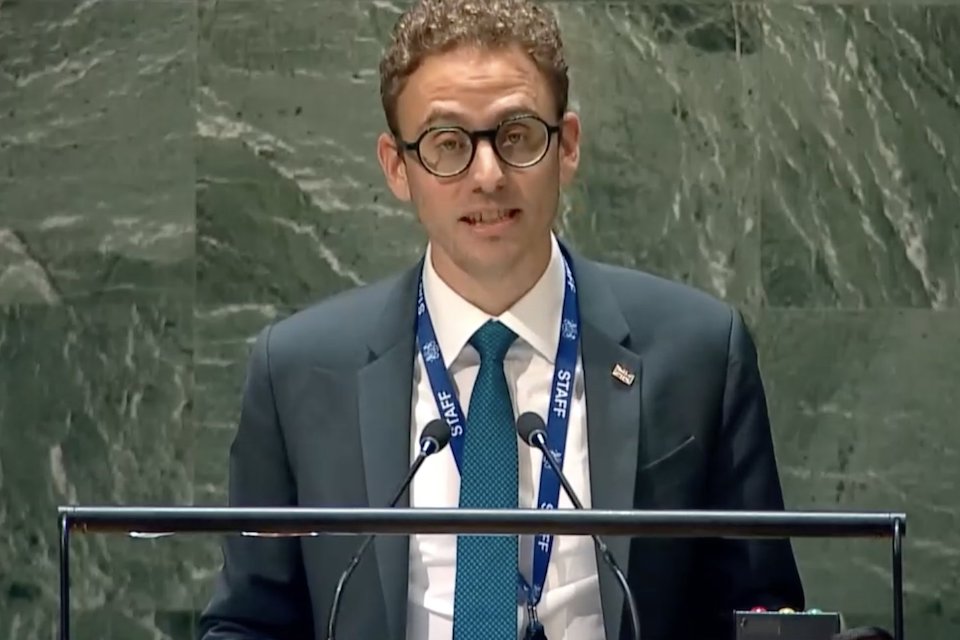
Calling for young peoples' voices to be harnessed to inform atrocity prevention efforts
Published By GOV.UK [English], Fri, Jun 24, 2022 7:31 AM
Thank you Mr. President,
I’d like to begin by thanking Special Adviser Nderitu for her statement
today. We also welcome Special Adviser Okoth-Obbo to his new role
and wish him every success.
And let me also thank the Secretary-General for his timely report on
advancing the Responsibility to Protect, with its focus on children and
youth. It is a stark reminder of the challenge ahead, as well as the
imperative for us to succeed. I will make three points today in this
regard.
First, on the importance of the responsibility to protect and prevent
mass atrocities. The world is facing alarming levels of violence and
displacement, with children and youth disproportionately affected.
Millions of children are suffering now and millions more face the risk of
mass atrocity crimes. Their safety, protection, dignity and welfare are
fundamental to humanity and the responsibility to protect provides a
framework for helping them.
Young people are powerful agents of peace and security, and their
voices must be heard and harnessed to inform atrocity prevention
efforts. Youth-led movements are demanding change to shape the world
they will inherit.
All States can contribute to the prevention of atrocities by identifying
drivers, triggers and risks of atrocity crimes, institutionalizing early
warning and prevention mechanisms, and by coming together to break
this cycle of violence. As part of the Security Council Working Group on
Children and Armed Conflict, we support the United Nations in its efforts
to get parties to conflict to enter into concrete action plans.
Which takes me to my second point. We can no longer accept
hesitation or inaction. Russia’s unjustified and unprovoked attack on
Ukraine has resulted in appalling and horrifying violations against
children, including credible allegations of sexual violence by the Russian
military. In Myanmar, abhorrent violence has been committed against
children, with credible reports of the military regime killing and torturing
children. In Syria, children born in the last decade have been subjected
to terrible hunger, deprivation and violence. And in northern Ethiopia, the
situation for women and girls remains deeply concerning and there are
reports of the continued use of sexual violence in Western Tigray.
Those responsible for these atrocities must be held accountable whether
through domestic prosecutions, the International Criminal Court or
otherwise. The United Kingdom will do all it can to hold these criminals
to account.
Third, the UK remains committed to atrocity prevention and
response. To give a couple of examples:
Last November we launched the Call to Action to Ensure the Rights and
Wellbeing of Children born of Sexual Violence in Conflict. This is a first
step in galvanising international action to improve the situation for this
vulnerable group. We call upon all states to endorse this Call to Action.
In addition, the United Kingdom is building international action on conflict
related sexual violence in a way that supports survivors and strengthens
existing structures. In particular, we are seeking to strengthen the
international legal architecture; build global political will; and drive action
and best practice on accountability for relevant crimes.
To conclude, there is a vocal minority that wishes to debunk the
responsibility to protect by ignoring the unanimously agreed World
Summit Outcome and by claiming falsely that it is a cover for illegal
interventions. We must not let this distract us. Atrocity crimes are
happening right now and there are risks of further crimes elsewhere. The
responsibility to protect simply calls on us to seek to prevent and
respond to these crimes. That is why the United Kingdom will call out
atrocities and atrocity risks. We expect others to do so too and, in this
vein, we would like future reports of the Secretary-General on R2P to
cover specific country situations. How can we protect children and youth
from atrocities if we only speak about them in the abstract? We need
practical case-by-case actions and not a debate about theory.
Thank you, Mr President.
Press release distributed by Media Pigeon on behalf of GOV.UK, on Jun 24, 2022. For more information subscribe and follow